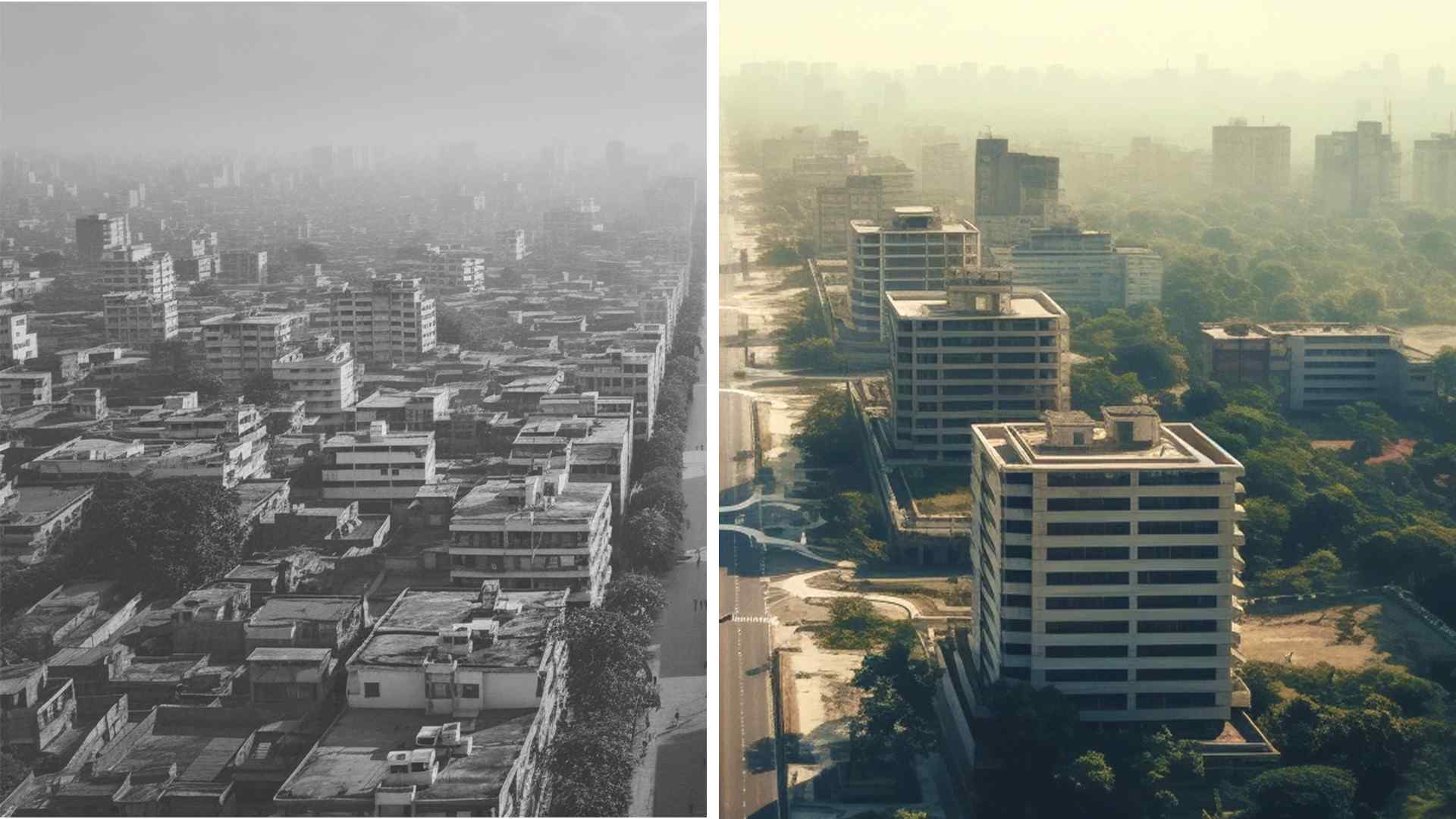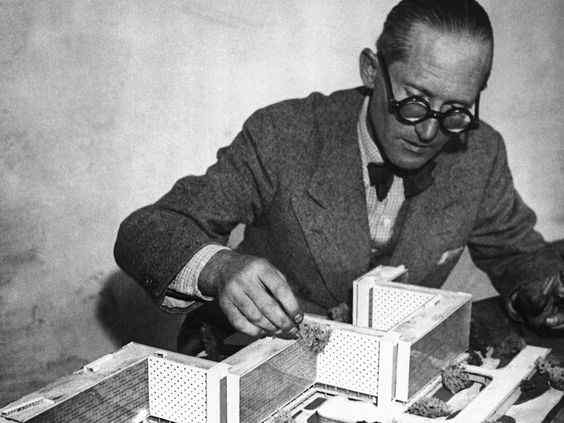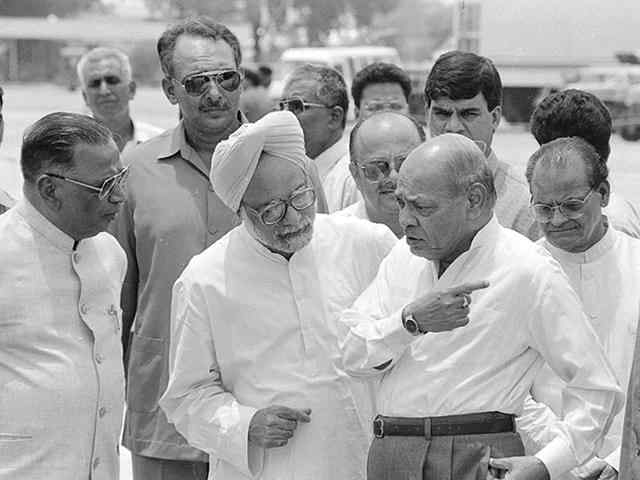India is a country with a long and rich history, and its real estate market is no exception. The real estate market in India has evolved significantly since independence in 1947, from a largely agrarian economy to a rapidly urbanising and industrialising nation.

Things we covered for you
The Challenges of Post-Colonial India

<Chandigarh, designed by Le Corbusier became Post Independent India’s first planned city.>
Read: Festive season to cheer up real estate
The early days of post-colonial India were a time of great challenge for the real estate market. The country was still recovering from the partition of India and Pakistan, and there was a shortage of housing, infrastructure, and investment.
However, the government took steps to address these challenges, such as the construction of new cities and towns, the development of industrial estates, and the growth of the tourism industry.
One of the first major projects undertaken by the government was the construction of Chandigarh, the new capital of Punjab. Chandigarh was designed by the famous architect Le Corbusier, and built to be a modern and efficient city. The construction of Chandigarh was a major milestone for the Indian real estate market, and it helped to set the stage for future development.
The government also took steps to develop industrial estates in the early days of independence. These estates were designed to attract foreign investment and create jobs. The first industrial estate was established in Kanpur in 1953, and it was followed by other estates in cities such as Mumbai, Delhi, and Ahmedabad. The development of industrial estates helped to boost the Indian economy and to create a demand for real estate.
The tourism industry also grew rapidly in the early days of independence. India is a country with a rich history and culture, and it has many natural wonders to offer tourists. The growth of the tourism industry created a demand for hotels, resorts, and other tourist accommodations.
The Liberalisation of the Indian Economy

The 1990s saw a major turning point for the Indian real estate market. The country under the leadership of Prime Minister P.V Narasimha Rao began to liberalise its economy, leading to an increase in foreign investment and a boom in urbanisation. The middle class in India also grew rapidly during this period, which created a demand for more housing and commercial space.
The liberalisation of the economy in the 1990s had a major impact on the Indian real estate market. Foreign investors began to pour money into the country, and this led to the construction of new skyscrapers, shopping malls, and other commercial developments. The growth of the middle class also created a demand for more housing, leading to the construction of new gated communities and apartment complexes.
The urbanisation of India is another major trend that has shaped the real estate market in recent years. The population of India is growing rapidly, and this is driving people to move to cities in search of jobs and better opportunities. The growth of cities has created a demand for more housing, and this has led to the construction of new suburbs and townships.
Read: RBI EMI moratorium: To avail or not to avail?
Opportunities for Investors and Developers
The Indian real estate market is full of opportunities for investors and developers. Here are a few trends to look out for in the coming years:
- Affordable housing: The demand for affordable housing is growing rapidly in India. The government is committed to providing affordable housing for all Indians, and this is creating opportunities for developers to build affordable housing projects.
- Logistics and warehousing: The growth of e-commerce is driving demand for logistics and warehousing space in India. Developers are building new warehouses and logistics parks to meet the growing demand.
- Data centres: The growth of the digital economy is driving demand for data centres in India. Developers are building new data centres to meet the growing demand.
- Coworking spaces: The growth of the gig economy is driving demand for coworking spaces in India. Developers are building new coworking spaces to meet the growing demand.
- Smart cities: The government is investing in the development of smart cities in India. This is creating opportunities for developers to build smart city infrastructure, such as smart buildings, smart transportation, and smart grids.
In addition to these trends, several other factors are likely to shape the Indian real estate market in the coming years. These include:
Read: Realty players see rising interest from home-buyers as families stay at home
- The rise of the middle class: The Indian middle class is growing rapidly, and this is creating a demand for more housing and commercial space.
- The Urbanisation of India: The Indian population is increasingly moving to cities, which is driving demand for urban real estate.
- The growth of the digital economy: The digital economy is growing rapidly in India, and this is creating demand for data centres, cloud computing, and other infrastructure.
- The impact of climate change: Climate change is a major challenge facing India, and it is likely to have a significant impact on the real estate market. For example, rising sea levels could threaten coastal real estate, and more extreme weather events could damage property.
Investors and developers who are aware of these trends and challenges are well-positioned to succeed in the Indian real estate market. By carefully planning and executing their strategies, they can make a significant profit and help to shape the future of the Indian economy
The Challenges Ahead
The future of real estate in India is bright. The country is expected to continue to urbanise and grow its middle class, which will create a demand for more housing and commercial space. The government is also taking steps to improve the infrastructure in India, which will make it easier for businesses to operate and for people to live and work in the country.
Read: Lawyers redraft rental agreements with new ‘lockdown’ clause
However, there are also some challenges that the Indian real estate market faces in the future. One challenge is the shortage of affordable housing. Another challenge is the impact of climate change, which could lead to flooding and other natural disasters that could damage property. The Indian real estate market will need to adapt to these challenges to continue to grow and prosper.
Achieve Real Estate Independence With NoBroker
The Indian real estate market is a dynamic and ever-changing landscape. The challenges and opportunities that lie ahead are significant, but the future of the market is bright. NoBroker is a leading real estate platform in India that helps people find the perfect home or investment property. With NoBroker, you can search for properties across India, connect with verified sellers and landlords, and negotiate the best possible price. The best part is their zero-brokerage policy.
NoBroker also offers a wide range of other services,such as home loans, property management, home services and home insurance. Here are some of the benefits of using NoBroker:
- Access to a wide range of properties: NoBroker has a vast database of properties across India, so you are sure to find the perfect home or investment property for your needs.
- Verified sellers and landlords: NoBroker only works with verified sellers and landlords, so you can be sure that you are dealing with a legitimate party.
- Negotiable prices: NoBroker allows you to negotiate the price of the property directly with the seller or landlord. This means that you can get the best possible price for your home.
- Convenient and easy-to-use platform: NoBroker is a convenient and easy-to-use platform. You can search for properties, connect with sellers and landlords, and negotiate prices all from the comfort of your own home.
- Affordable fees: NoBroker’s fees are very affordable. You only pay a small fee when you successfully purchase or rent a property through the platform.
If you are looking for a reliable and trustworthy real estate partner in India, then NoBroker is the perfect choice for you. With NoBroker, you can find the perfect home or investment property, negotiate the best possible price, and get the job done quickly and easily.










